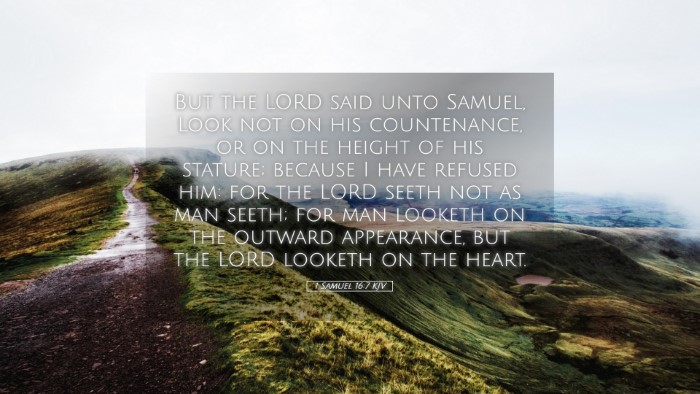Commentary on 1 Samuel 16:7
Verse: "But the LORD said to Samuel, 'Do not look at his appearance or at his physical stature, because I have refused him. For the LORD does not see as man sees; for man looks at the outward appearance, but the LORD looks at the heart.'" (1 Samuel 16:7, NKJV)
Introduction
This critical verse in 1 Samuel reveals profound truths about divine selection and human perception. The context of this passage involves God's instructions to Samuel to anoint a new king from the sons of Jesse, as King Saul's reign was coming to an end due to his disobedience. This verse serves as a pivotal reminder of how God’s vision transcends human standards, which serves as an important lesson for pastors, students, theologians, and Bible scholars. The insights drawn from various public domain commentaries will provide a deeper understanding of this scripture.
Commentary Insights
God's Sovereignty in Choice
Matthew Henry Commentary: Henry emphasizes God's sovereign choice in the anointing of David, contrasting it with human tendencies. He indicates that God's selection is not based on outward qualifications but on inward qualities. The instruction to Samuel signifies God's rejection of Saul based on his heart condition, illustrating that external appearance does not determine one's fitness for service in God’s eyes.
The Heart as the Focus of Divine Perception
Albert Barnes Commentary: Barnes elaborates on the profound declaration that “the LORD looks at the heart.” This statement challenges believers to consider their motives and sincerity in their service to God. He states that while humans may be impressed by outward characteristics such as wisdom, strength, and beauty, God requires an inward purity and commitment. This insight encourages deep self-examination.
Critique of Human Judgment
Adam Clarke Commentary: Clarke provides critical analysis on the fallibility of human judgment, noting that people often form their opinions based on visible traits without knowing the spiritual condition of the heart. He highlights that this passage admonishes leaders, particularly those tasked with roles of authority, to look beyond superficial assessments when making decisions, thus calling for integrity and discernment in leadership.
Theological Implications
This verse carries significant theological weight, challenging both individual believers and communities as they seek to discern God’s will. The implications of God’s preference for the heart over mere appearance suggest a paradigm shift in how we understand leadership and worthiness in spiritual contexts.
Divine Appraisal versus Human Appraisal
Understanding that God appraises each person based on their character and spiritual condition helps cultivate a community that values humility and authenticity. Samuel’s initial focus on Eliab’s appearance mirrors a common human tendency to prioritize image. This warning resonates in today’s society, encouraging believers to seek spiritual depth over superficiality.
Practical Applications
In recognizing that God sees the heart, pastors and leaders are encouraged to foster environments where authentic faith can flourish. This can involve:
- Encouraging Authentic Relationships: Pastors should build communities that value genuine relationships over mere appearances, fostering accountability and love.
- Promoting Heart-Centered Leadership: Church leadership processes should emphasize character and spiritual maturity as primary qualities for leadership roles.
- Redefining Success: Challenges should be met with the understanding that true success is measured by faithfulness and integrity rather than by numerical growth or external accolades.
Conclusion
This verse, 1 Samuel 16:7, epitomizes a fundamental truth about God’s character and His dealings with humanity. As outlined in the commentaries by Matthew Henry, Albert Barnes, and Adam Clarke, it reinforces the necessity for spiritual discernment and attentiveness to God's voice above societal norms. For pastors, students, theologians, and Bible scholars alike, embracing a heart-focused approach in their spiritual journeys and respective ministries can lead to more profound and impactful legacies for the Kingdom of God.
Reflection: As you ponder this verse, consider how the Lord might be calling you to reflect His heart in your own life and ministry. What changes can you make to align your vision with His?


